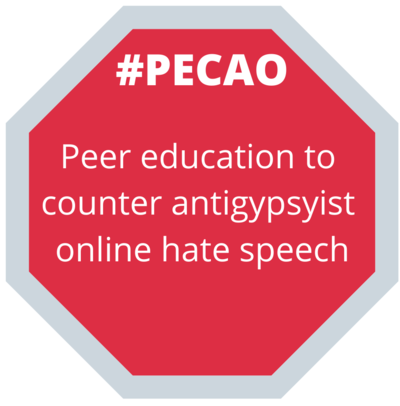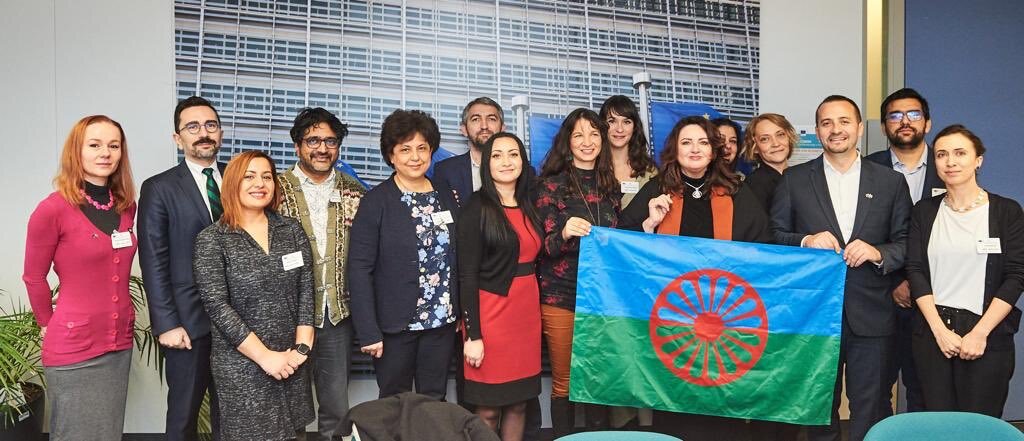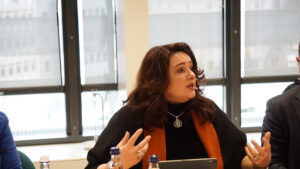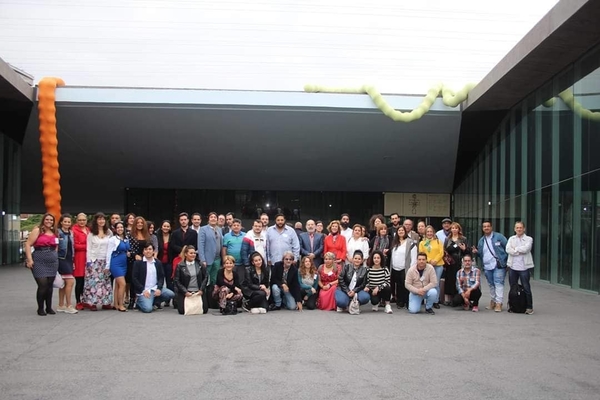Covid-19 – extreme hardship and solidarity in these times of crisis
The Covid-19 crisis affects everyone, and the virus does not differentiate between people; anyone could catch it, no matter how rich or poor. Most people suffer under lockdowns, most people are scared and many will need income support in the coming weeks. However, while many people are confined in their comfortable homes and can use their laptops to continue working or learning from home, marginalized communities such as the Roma are facing extreme hardship in this time of crisis.
Many Roma across Europe work in the informal sector, for example in street markets or digging in landfills. Now that they are not allowed to leave their homes, they are left without any income, have no savings and do not receive unemployment benefits, or any other form of social assistance. Today in Europe, hunger is a real. Thousands of people are left without food.
Many Roma live in poor housing in segregated communities, without running water in their homes or sufficient space to self-isolate. Roma are already statistically with poorer health, so more at risk in this crisis. And while other children continue their schooling through online classes, this is not possible for many Roma children simply due to a lack of internet access in their neighbourhoods, and of PCs in their homes.
And finally, adding to these devastating living conditions, comes widespread antigypsyism: Roma communities facing stricter restrictions than other neighbourhoods, Roma travelers being controlled more often and Roma even falsely blamed of carrying the virus. Governments are using the health threat to push forward racist policies, when they should do exactly the opposite and pay special attention to vulnerable groups.
ERGO Network together with its partners is asking governments to remain vigilant against racist acts and calls on the European Commission to ensure that the newly released EU Solidarity Fund to respond to the crisis fully takes into account the needs and rights of Roma and other marginalized communities. Member States must guarantee that poor and marginalized communities have access to clean drinking water, food, health care and housing, as well as to reliable information. If these communities are not supported now, the social crisis that will follow the health-crisis will haunt Europe for a long time to come. (Read here our joint letter to EU Commissioner Helena Dalli with the ERRC and several other (pro-)Roma civil society organisations).
At the same time, ERGO Network members on the grassroots level are putting extraordinary levels of energy into supporting the people on the ground and show a spirit of solidarity that others can learn from! Here are just some examples of their great initiatives:

Integro Association, Bulgaria
Immediately after the outbreak Integro established a coordination group of NGOs and relevant government representatives. Through this group they can convey needs and difficulties identified on local level and propose solutions, with a direct contact to the National Headquarter for combating the Corona-virus infection.
All health and education mediators of Integro are visiting Roma neighbourhoods to provide information, monitor quarantine and refer people to specialists. They also distribute schooling materials for children who cannot take part in online learning. At Integro’s suggestion, many mediators are also included in municipal coronavirus teams and receive protective equipment. As the equipment is not sufficient, Integro is looking for suitable fabrics so that the women at the organisation’s Roma Mother Centres can sew masks for mediators and activists. Integro also translated a brochure and video from the Roma Standing Conference on preventing the coronavirus infection from Bulgarian and Romanes into Turkish, the language of many Roma communities in Bulgaria. 15,000 brochures of the brochure have been printed!
In addition, the association proposed urgent measures to be taken by local authorities to support Roma communities, and many of them complied and provide for example food packages and water tanks. Integro also discusses with the Ministry of Education to provide internet access, and with IT companies to provide old computers to the communities so that children can participate in online learning programmes. Last but not least, they closely monitor whether rights of the Roma are violated.
 Nevo Parudimos, Romania
Nevo Parudimos, Romania
Our members from Resita in Romania convinced the municipality to distribute weekly food packages to poor families and have already distributed 160 wash basins, antibacterial soap and disinfectants to families in the marginalized neighbourhoods of Mociur, Dealu Mare and Câlnic, where many Roma live.
Nevo Parudimos has also agreed with a textile factory to produce 1000 face masks for people in need. Nevo Parudimos will provide the material and the factory will produce the masks free of charge. The European Solidarity Corps volunteers hosted by Nevo Parudimos are spending their days sewing masks in self-isolation. Nevo Parudimos is keeping their spirits up by daily group calls and online activities.
Upre Roma, Italy
In Northern Italy, where the situation is worse than anywhere else in the world, our member Upre Roma is putting all efforts into activating political contacts and lobbying all administrative and political levels to provide basic necessities for poor communities. 40,000 poor people, many of them Roma, are left without food. No NGO would have the means or would even be allowed to support all these people, so political action is needed. Upre Roma has also started a petition to demand access to clean water for Roma camps. At the same time, the activists are constantly on the phone, informing people about how to access their rights, how to get support etc.
Butterfly Development, Hungary
Pro Cseherat is running a successful community gardening programme with Roma communities for many years already. In times of confinement and lack of financial resources, self-reliance through gardening can take a great burden from poor families. Pro Cseherat is therefore developing a distant learning programme through Facebook that explains how to start one’s own vegetable garden.
Slovo 21, Czech Republic
In this exceptional situation Slovo 21 is intensively communicating with members of the Roma Women’s group Manushe, which organizes Roma women through sharing Facebook posts and events. Together they coordinate the sewing of facemasks, which are distributed for free within their localities and to hospitals. Face masks are obligatory to wear in Czech Republic when leaving the house, for example to buy food or seek medical attention.
Besides these concrete examples, all member organisations focus in particular on providing information and lobbying their governments. They explain new rules concerning self-isolation, inform where to get financial assistance, give mental health support and provide essential hygiene tips. They are lobbying their governments to provide extra support to Roma communities, to stop evictions and to end discrimination of marginalized groups who suffer disproportionally under the crisis. None of us could do anything to mitigate the crisis on our own. Coordination is needed, and Roma NGOs need to be included in crisis response teams to ensure Roma are not left out of any support measures.
Do you want to share what you are doing? You can send information about your activities to info@ergonetwork.org and we will share it with other activists!
Do you observe rights violations against Roma in this crisis? Please provide information to the Fundamental Rights Agency, which is investigating the impact of Covid-19, by sending information to frp@fra.europa.eu.
Do young people in your organisation are organising solidarity actions? ERGO Network is partnering with FEMYSO for the campaign #OutbreakofGenerosity which offers a great guide for young people’s work during this crisis. http://outbreakofgenerosity.org/






 “Roma people have been living in Europe for more than 700 years and have massively contributed to the richness of the European heritage. Yet, for centuries, European societies have turned a blind eye to racism and widespread discrimination of Roma people. We have to change that”, Commissioner Dalli committed to the ERGO Network members during this first meeting with Roma civil society representatives of her mandate.
“Roma people have been living in Europe for more than 700 years and have massively contributed to the richness of the European heritage. Yet, for centuries, European societies have turned a blind eye to racism and widespread discrimination of Roma people. We have to change that”, Commissioner Dalli committed to the ERGO Network members during this first meeting with Roma civil society representatives of her mandate.